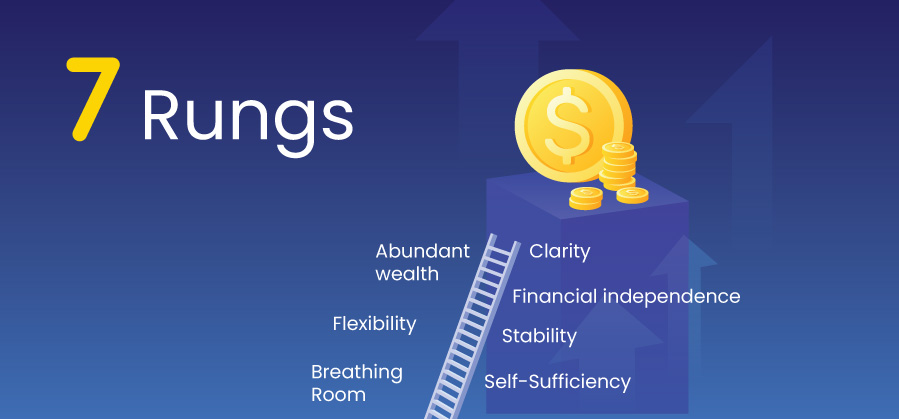7 Rungs to Ladder of Financial Freedom

Being financially secure comes with various promises, and a long term security. This has undoubtedly always been a common aspiration for the majority of people, but recently it has gained as a means of expression. Most of us crave a life free of the daily grind of working for money since it is so ingrained in us.
It is possible to achieve a level of financial independence that allows one never to have to work again in their whole lives. Many people are fortunate enough not to be obligated to work. People who have substantial inheritances and those who will be taxed for the rest of their lives can both be found, but it takes most of us a lifetime to get there if we ever get there.
There are many distinct levels of financial independence, and it's important to know what they entail. Here are 7 rungs to ladder of financial freedom.
1. Clarity:
Knowing where you stand financially and what you're capable of achieving can help you make smarter financial decisions. Before you can go to where you want to go, you need to know where you are. If you ignore your credit card statements, things will only become worse. Creating a budget is recommended by financial professionals, but the concept of doing so puts off many individuals. To begin, keep a running tally of your income and costs and identify areas where you may reduce your spending.
2. Self-Sufficiency:
Self-sufficiency, the ability to care for one's own needs, is an essential component of any form of independence. As a means of ensuring your own survival, you'll need a steady source of income that will allow you to purchase necessities like food and transportation. You may have to lower your expectations a bit if you're expecting too much.
3. Breathing Room:
This level is achieved when you stop surviving paycheck to paycheck. There is no room to breathe, especially in the event of an emergency, if you have saved six months' worth of living expenses. Only 39 percent of respondents to Bankrate's 2018 financial security index study were able to come up with $1,000 in an emergency.
According to the Federal Reserve's 2017 Report on the Economic Well-Being of U.S. Families, 40% of households would be unable to meet a $400 unexpected bill. Most of us may face unexpected expenses such as auto repairs, medical bills, and evenings out drinking with friends throughout the year. Having an emergency fund on hand would come in helpful in such instances.
4. Stability:
When you've paid for six months' worth of living costs and don't owe anyone money, having stability offers you a little more room to move. Also, you're able to take minor risks since you have emergency money as a safety net. If you're making more money than you're spending, you're in a position to decide what to do with the extra.
It's not uncommon for folks to get stuck in this phase and never come out the other side. Whenever they have extra money, they spend it on enhancing their lifestyle.
You need to save and invest your extra money in order to move on from this stage. In order to develop money, this is the first step.
5. Flexibility:
A year's worth of expenditures will safeguard you against unexpected costs, but a year's worth of expenses will allow you to live your life how you choose. Once you've achieved this degree of financial success, it's a good idea to review your priorities and reward yourself.
6. Financial Independence:
It's no longer necessary for a person to work to live off their investment income. We all want to get to this point in our lives. When your investment income covers your basic needs and most of your personal extravagances, you've achieved full financial freedom. Your annual budget includes a "safety net" that may be used in the event of an emergency.
You've achieved "enough," and you'll never have to work again.
Even after achieving Financial Independence, it's not unusual for people to continually worry about money. When it comes to elderly parents, unanticipated crises, or the sequence of returns risk, it may be nerve-wracking to think about. Nevertheless, people who have attained financial independence often keep working and saving to keep moving forward.
7. Abundant Wealth:
Your investment portfolio is now generating more income than you require to live comfortably. Unfortunately, over time, the gap between what you have and what you need will widen.
This is the stage when you have the most control. All of your life decisions should be based on your level of satisfaction, not on the amount of money you save. When you're well-off, you're in an excellent position to give back to your community, aid your loved ones, and leave a lasting legacy.
Conclusion
It will take time to rise through the ranks of financial independence. However, the financial burden should decrease as you rise through the ranks, and your options—where you work, where you live, and what you drive—will expand. Let us all be financially free!
